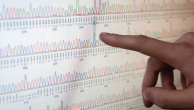
Majority in U.S. Says Public Health Benefits of COVID-19 Restrictions Worth the Costs, Even as Large Shares Also See Downsides
73% say they are vaccinated, but at least half express confusion, concern over vaccine information and health impacts.
73% say they are vaccinated, but at least half express confusion, concern over vaccine information and health impacts.
No more than half of Americans say they think solar geoengineering and cloud seeding would make a difference in reducing the effects of climate change.
81% of Black Americans consider the outbreak a major threat to public health and about half see it as a major threat to their personal health.
As artificial intelligence plays a growing role in the everyday lives of people around the world, views on AI’s impact on society are mixed.
Majorities say scientific research on gene editing is a misuse – rather than an appropriate use – of technology. But public acceptance of gene editing for babies depends on how it will be used, and views often differ by age and religion.
Majorities across 20 publics say government investments in scientific research are worthwhile and express a lot or some confidence in scientists to do what is right for the public.
Nearly seven-in-ten Americans think it is very important for the United States to be a world leader in scientific achievements.
There are widely held concerns about the safety and effectiveness of a possible vaccine and the pace of the approval process.
Over the centuries, the relationship between science and religion has ranged from conflict and hostility to harmony and collaboration, while various thinkers have argued that the two concepts are inherently at odds and entirely separate.
Relatively few Americans say they have tested positive for coronavirus antibodies, but many more believe they may have been infected.








